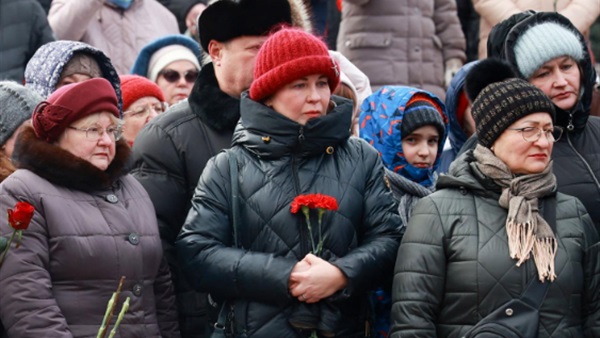Russia blames soldiers’ phones for Ukrainian rocket attack which killed new recruits

Russia’s defence ministry has
blamed its soldiers’ use of mobile phones for a Ukrainian missile strike which
killed at least 89 servicemen.
Four Ukrainian missiles hit a
temporary Russian barracks in occupied eastern Ukraine on New Year’s Eve,
according to the ministry.
The Ukrainian armed forces have
claimed that some 400 newly mobilised Russian army recruits were killed in the
attack on a vocational college which was housing the troops in Makiivka, a city
of about 300,000 people, ten miles east of Donetsk.
While Russia has ordered an
investigation, the defence ministry in Moscow claimed the main reason for the
attack was the illegal use of mobile phones by its servicemen.
“This factor allowed the enemy to
track and determine the co-ordinates of the soldiers’ location for a missile
strike,” it said in a statement issued just after 1am local time this morning.
Russian nationalist bloggers and
some pro-Russian officials in the region suggested the death toll may be in the
hundreds, but officials have disputed these claims.
Semyon Pegov, a prominent Russian
war correspondent awarded the Order of Courage by Putin last year, also
questioned whether mobile phones could be used to target an attack.
“The story of mobiles is not very convincing,”
he wrote on Telegram. “I rarely say this — but this is the case when it would
probably be better to remain silent, at least until the end of the
investigation. As such it looks like an outright attempt to smear the blame.”
Both Russians and Ukrainians have
been known to track and exploit their opponents’ phone signals during the
ten-month conflict. The Russian Leer-3 system involves using a pair of drones
and a ground vehicle in order to track and jam phone signals over a nearly 6km
radius. Ukraine has similarly managed to geo-locate and kill a Russian general
using an unsecured phone.
However, the attribution of blame
to mobile phone usage could simply be part of a shifting Kremlin strategy to
explain away their failings over the course of the war — especially since
Russia’s retreat from the southern city of Kherson.
Dr Gregory Asmolov, an expert in
crisis communication at King’s College London, said Russia “had to start to
explain why bad things were actually happening and why they were not able to
provide victory as soon as it was promised,” adding that the ultimate goal is
to ensure that the Kremlin “is immune” from criticism.
Workers sift through debris after
a three-storey building used a temporary Russian barracks for new conscripts
was hit by US rockets supplied to UkraineWorkers sift through debris after a
three-storey building used a temporary Russian barracks for new conscripts was
hit by US rockets supplied to Ukraine
“We don’t really know if [the latest strike]
was because of the mobile phones or not,” he added. “But as a strategy for
crisis communication and as an effort to attribute blame not to the high
commanders, not to politicians, not to the authorities, but just to like those
people, soldiers, who were recently mobilised and framing them as
irresponsible, and responsible for their own death is their strategy of blame
attribution . . . I think this is the main message: ‘we are not responsible for
what happened to the soldiers that were recently mobilised’.”
The Russian ministry of defence
claims the three-storey building was razed out by US-supplied Himars rockets and
accused Ukraine of exaggerating the casualties.
The defence ministry initially
said 63 Russian soldiers were killed in the weekend strike but has revised that
number up to 89 in Wednesday’s statement.
Pegov also suggested that the
number of casualties from the attack would rise.
“Unfortunately, their number will continue to
grow. The announced data is most likely for those who were immediately
identified. The list of the missing, unfortunately, is noticeably longer. I
cannot disclose the sources, but I consider them reliable.”
In Samara, a city about 600 miles
southeast of Moscow where some of the dead servicemen came from, around 200
people gathered to lay flowers and wreaths at a rare public commemoration in
Russia.
Soldiers fired a gun salute while
some mourners could be seen holding flags of United Russia, President Putin’s
party.
“It’s very tough, it’s scary. But
we cannot be broken. Grief unites,” Ekaterina Kolotovkina, head of a group of
army spouses, said at the ceremony.
Kolotovkina, the wife of a
general, said she had asked her husband to “avenge” the victims. “We will crush
the enemy together. We are left with no choice,” she told mourners.
Similar gatherings were reported
in other cities of the Samara region.
“What conclusions will be drawn? Who will be
punished?” Mikhail Matveyev, a member of the Russian parliament representing
the city, wrote on social media.
In Kyiv, President Zelensky did
not mention the attack in his nightly video address on Tuesday.
The Ukrainian leader warned that
Russia was set to launch another major offensive against his country after a
series of setbacks and slow progress in the ten-month invasion.
“We have no doubt that [the] current masters
of Russia will throw everything they have left and everyone they can round up
to try to turn the tide of the war and at least delay their defeat,” said
Zelensky.
“We have to disrupt this Russian scenario. We
are preparing for this. The terrorists must lose. Any attempt at their new
offensive must fail.”
Russian officials have denied
that Putin will order a full-scale mobilisation.







